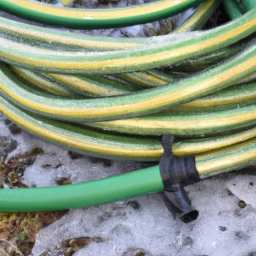How To Keep Garden Hose From Freezing
Table of Contents []
How To Keep Garden Hose From Freezing
Introduction
Most homeowners dread the frigid winter months, knowing that their beloved garden may suffer because of the cold temperatures. Protective measures for garden plants are always a priority, but there is another element of outdoor gardening that could suffer during the colder months: the garden hose. Garden hoses can often become frozen and crack, or worse, no longer be usable due to the cold. Luckily, there are a few different ways you can keep garden hoses from freezing and make sure your plants get the water they need.
Winterizing the Hose
The most obvious way to ensure your garden hose won't freeze is to winterize it. No matter what type of hose you have, you should make sure you fit it with a freeze-proof type of connector and a frost-proof faucet. This will ensure the hose doesn't freeze up and become damaged or unusable. If you have any hoses that are left above ground, they should be well insulated and stored before the cold of winter sets in.
Draining
The other most important way to make sure your garden hose doesn't freeze up is to ensure that it is drained properly before the cold sets in. Make sure to thoroughly drain the hose by blowing air through it or turning it upside down and flushing it with a gentle water stream. This will ensure that any remaining water is expelled from the hose and won't freeze, thus preserving the life of the hose.
Preventing Freezing
There are a number of preventative measures you can take to ensure your garden hose doesn't freeze, especially in very cold climates. You might consider wrapping your garden hose in towels, moving it indoors, or using an outdoor heater to keep it warm. Another tip is to purchase a hose oil that can be applied to the outside of the hose to act as an insulation and reduce the chance of freezing.
Cooling and Heating
In order to reduce the chance that your garden hose will freeze, you should also consider installing a cooling or heating tape around the hose. This will provide another layer of protection to make sure the hose does not become frozen during the cold months.
Using Plastic Bags
If you have an above ground hose that is particularly exposed to the elements, you can also try wrapping it in plastic sheets or bags to keep it warm. This technique is quite effective when used in addition to other methods, but it's important not to use this method if the hose will be exposed to direct sunlight.
Using Salt
Another tip to help keep your hose from freezing is to wrap it in a saltwater-soaked cloth. The salt will help to keep the temperature of the hose constant and reduce the chance of freezing. Be sure not to leave the salt-soaked cloth on for too long, however, as the salt could eventually damage the hose.
Preventative Maintenance
Finally, remember that it's important to practice preventative maintenance on your garden hoses in order to keep them functioning throughout the winter. Regularly inspect the hoses for signs of wear and tear, and check the connections and fittings to make sure they are working properly. This will help to ensure your hoses last for many years to come.
Conclusion
Preventing your garden hoses from freezing is important for keeping your garden plants alive and well during the cold winter months. Utilizing these tips and techniques will help you to properly winterize and care for your hoses and ensure they remain in good working order for years to come.

Previous Page
